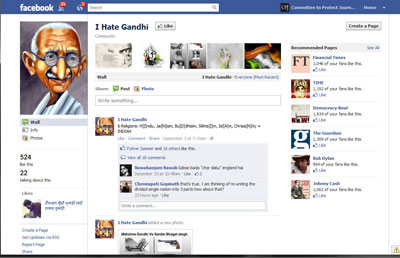As Internet penetration deepens, largely religiously and socially conservative India is struggling to cope with concerns about controversial web content and its easy accessibility to a vast population, all with little oversight. Local courts have become the launching point for some of the anti-Web offensives.
On December 21, a civil court in Delhi ordered 22 websites–including Google, Yahoo, Microsoft, Facebook, and smaller ones like Orkut Blogspot, Topix, Exbii, Boardreader, and Zombietime–to remove content deemed “anti-religious” or “antisocial.”
And on December 23, 21 website operators, again including Google, Orkut, and Facebook, were summoned to court on charges of criminal conspiracy and spreading obscene content and given until February 6 to remove it. “The accused in connivance with each other and other unknown persons are selling, publicly exhibiting and have put into circulation obscene, lascivious content,” Metropolitan Magistrate Sudesh Kumar said when he handed down his decision in Delhi, according to a Press Trust of India report.
Magistrate Kumar also ordered the central government to file a report to his court by January 13, explaining its plans to control what he considers the growing amount of offensive and derogatory content on websites. A copy of the order was sent to bureaucrats who head various government ministries, including Communications and Information Technology, Home Affairs, and Law and Justice.
The magistrate might well have an ally in Kapil Sibal, the minister for communications and information technology. Earlier in December, he tried to regulate online content by asking site operators to take steps to pre-screen content and filter offensive material. The suggestion unleashed a storm of protest from media activists who said the government was resorting to forms of censorship and monitoring the Internet which went against the basic principles of freedom of speech outlined in the Indian Constitution.
But Sibal’s calls echo a grass roots attitude. On Monday, social activist Nutan Thakur based in Lucknow, capital of the north Indian state of Uttar Pradesh, filed a complaint against Facebook and one of its users for allegedly posting comments and spreading hatred against Hindu’s holy scripture, Bhagavad Gita. In her complaint, Thakur alleged that the comments on Facebook were enough to provoke anger and trigger communal riots, according to local media. Earlier, her husband had done something similar, angered by a Facebook discussion group called “I hate Gandhi.”
The International Telecommunication Union (ITU) says Internet usage is accelerating in India, driven by the use of mobile devices like smart phones. The ITU says mobile data usage in India grew by almost 35 percent between June 2011 and September 2011. With about 100 million users online (a low number given India’s population of 1.17 billion) India is already the country with the third largest number of Internet users, behind China and the United States.
